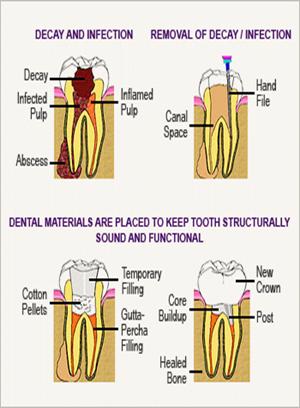Root Canal

Root canal therapy is necessary when the nerve of a tooth is affected by decay, infection or traumatic injury. The pulp (the living tissue inside the tooth) is unable to repair itself so in order to save the tooth, the decay, bacteria, nerves and the pulp are removed during root canal treatment. The roots of the tooth extending down into the bone are cleaned out and the resulting space is filled with medication to help eliminate bacteria.
Many patients believe that extracting the tooth is the only option however a missing tooth can cause significant problems in chewing, speech and jaw alignment. When a missing tooth is not quickly replaced the adjacent teeth may shift causing them to become crooked or crowded. Today’s root canal therapy is the preferred method of retaining your natural teeth and is highly successful – usually lasting a lifetime.
- What are the signs that root canal therapy is needed?
- An abscess (or pimple) on the gums
- Sensitivity to hot and cold
- Severe toothache pain
- Sometimes no symptoms are present
- Swelling and/or tenderness
- Decay has reached the tooth pulp (the living tissue inside the tooth)
- Infection or abscess have developed inside the tooth or at the root tip
- Injury or trauma to the tooth
What happens during root canal therapy?
Root canal therapy generally requires one appointment and can be performed by a dentist or an endodontist (a root canal specialist). Once the tooth is numb, an opening is made on top of the tooth so that the pulp, nerve tissue, decay and bacteria can be removed. The canal(s) are then filled and sealed to prevent further infection. A temporary filling is placed in the opening until a crown can be constructed to restore the tooth back to its’ full form and function.
 Will I be in any pain?
Will I be in any pain?
If you have been in pain or had any sensitivity prior to the root canal it may be caused by an infection or damage to the pulp. The root canal therapy itself does not cause any pain however your tooth may still be a little sensitive after treatment. This will subside as the inflammation diminishes and the tooth has begun to heal.
Are there special instructions after a root canal?
Generally you will need to schedule for crown placement shortly after root canal therapy. A crown protects the tooth from re-infection and fracture. Good oral hygiene practices and regular dental visits will aid in the long-term success of your root canal treatment.
